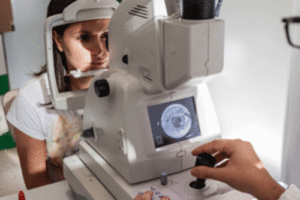See us straight away
 If at any time you suffer from symptoms, such as ‘fogs’ and pressure in either eye, flashes, headaches or loss of vision, please see one of our experienced team immediately and we will carry out a comprehensive assessment of your eyes. Spotting glaucoma symptoms early can make the world of difference to your sight.
If at any time you suffer from symptoms, such as ‘fogs’ and pressure in either eye, flashes, headaches or loss of vision, please see one of our experienced team immediately and we will carry out a comprehensive assessment of your eyes. Spotting glaucoma symptoms early can make the world of difference to your sight.
What is Glaucoma?
Glaucoma is no laughing matter. It is the second leading cause of blindness worldwide, but early diagnosis and modern treatment mean glaucoma can be well managed.
Glaucoma damages the optic nerve and leads to vision loss. The pressure inside the eye is maintained by fluid. If the eye’s drainage system is not working properly, the pressure inside the eye can increase, causing damage to the optic nerve: the ‘cable’ that sends images from the eye to the brain.
Can Glaucoma be treated?
Each person’s actual risk of vision loss will depend on how advanced the glaucoma is when it is first diagnosed. The more advanced glaucoma is, the greater the risk. Catching glaucoma symptoms early is vital.
Regular, comprehensive eye examinations with trusted eye professionals are critical. Glaucoma becomes much more common as we age. In its early stages, there are few symptoms, which is why it is sometimes referred to as the “silent thief of sight”. It can slowly sneak up and causes irreparable harm before you know it.
The sight thief
It is often not until the late stages of the disease, after significant damage has already been caused, that people with glaucoma begin to notice eye problems, such as a loss of peripheral vision and slow vision loss. We want our optometrists to check your eyes before symptoms appear so that if glaucoma does develop, it is caught early when treatment is most effective. Then with regular follow-ups and adherence to the prescribed treatment, we can slow or stop the Glaucoma’s stealthy progression.
Regular eye exams at John O’Connor Optometrists include examining the optic nerve through a microscope, as well as measuring pressure within the eye. We also recommend digital retinal photography, so our optometrists can see even more of the retina and thereby detect the very earliest signs of disease.
Keep an eye on your family
Glaucoma has a hereditary and non-hereditary form, meaning everyone is at risk of developing it. However, individuals with a family history of the disease are more likely to be affected. So, If you have a close relative who has been diagnosed with glaucoma, make sure our optometrists are fully aware of it. We can then take retinal images, and by comparing your photos from year to year, we can spot even the most subtle of changes to your eye health.
See us for regular, comprehensive eye tests
We recommend a comprehensive eye exam once every two years for people aged 40 to 54, and every one to two years for those aged over 55, even if there are no known problems with eyes or vision.

